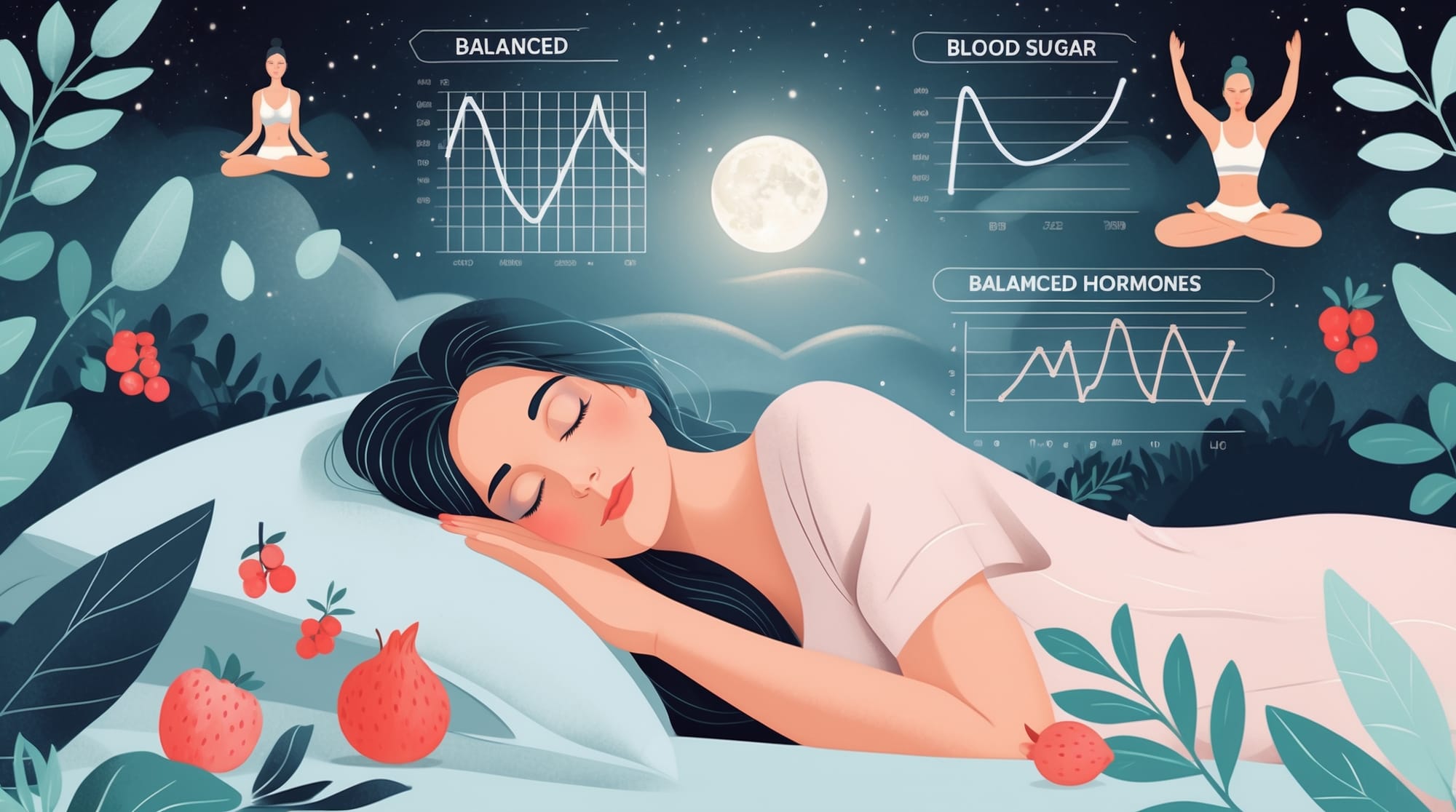How Blood Sugar Affects Your Mood, Sleep, and Hormones in Midlife
Discover how blood sugar imbalances in midlife impact mood, sleep, and hormones—and learn science-backed strategies to stabilize your energy, improve rest, and support hormonal health.

Keeping blood sugar levels in check is key for health, but it's even more important in midlife. It greatly affects mood, sleep, and hormones. Men and women in their 40s and 50s often see big changes in these areas. Diet, lifestyle, and other factors play big roles.
Knowing how blood sugar changes impact these areas can help improve life quality. It's about making smart choices for better health.

Key Takeaways
- Blood sugar levels significantly affect mood stability and emotional well-being.
- Irregular blood sugar can disrupt sleep patterns and reduce sleep quality.
- Hormonal changes in midlife can lead to fluctuations in blood sugar levels.
- Post-menopause, controlling blood sugar becomes even more critical for overall health.
- Insulin plays a vital role in maintaining balanced blood sugar levels.
- Incorporating physical activity and a balanced diet can stabilize blood sugar levels.
The Connection Between Blood Sugar and Mood Swings
It's important to understand how blood sugar levels influence emotions. Mood swings can happen when blood sugar levels change. This is because the body's energy levels also change, leading to feelings of instability and irritability.

High blood sugar (hyperglycemia) and low blood sugar (hypoglycemia) can really affect your mood and how clear you think. Symptoms like hunger, tiredness, confusion, and anxiety are common. These symptoms can make it hard to focus or stay calm, making mood swings worse.
During times like menopause or andropause, these blood sugar changes can get even more intense. This can lead to even more emotional ups and downs.
| Blood Sugar Condition | Emotional Symptoms | Physical Symptoms |
|---|---|---|
| Hyperglycemia | Irritability, anxiety | Hunger, fatigue |
| Hypoglycemia | Confusion, mood swings | Fatigue, hunger |
Knowing these patterns can help manage emotional health better. So, keeping blood sugar levels balanced is key for emotional stability, even during big life changes.
How Blood Sugar Fluctuations Affect Sleep Quality
Understanding the role of blood sugar in regulating sleep patterns is key. Fluctuations can really mess with sleep quality. When blood sugar swings too high or too low, it can cause restlessness and insomnia.
This instability messes with the body's natural sleep cycle. It makes it tough to get a good night's sleep.

To keep blood sugar stable and sleep better, there are many ways. Eating balanced meals with the right mix of proteins, fats, and carbs is helpful. Eating at regular times is also important.
Exercise is another key factor. It helps keep blood sugar steady and improves sleep quality.
It's also important to know the role of blood sugar in regulating sleep patterns to sleep better. Making small changes in your life can help a lot. For instance, avoiding sugary snacks before bed can stop blood sugar spikes that hurt sleep.
These steps not only help sleep but also boost overall health.
The Impact of Hormonal Changes on Blood Sugar Levels in Midlife
As people reach midlife, hormonal shifts become more noticeable. These changes affect health in many ways, including blood sugar levels. Women in menopause see a drop in estrogen and progesterone, which can harm insulin sensitivity.
Men also face changes in testosterone levels. This hormone is key in controlling blood sugar. These hormonal shifts can make it harder for the body to keep blood sugar stable. This raises the risk of insulin resistance and type 2 diabetes.
Hormones and blood sugar have a complex relationship. For example, cortisol, the stress hormone, can make blood sugar levels rise when we're stressed. It's important to understand how these hormonal changes affect blood sugar to manage it well in midlife.
The table below outlines the primary hormones involved in blood sugar regulation and their effects:
| Hormone | Effect on Blood Sugar |
|---|---|
| Estrogen | Improves insulin sensitivity; its decline may lead to insulin resistance |
| Progesterone | Affects insulin secretion; fluctuations can destabilize blood sugar |
| Testosterone | Regulates fat distribution; low levels may increase visceral fat and insulin resistance |
| Cortisol | Elevates blood sugar during stress, impacting overall glucose control |
Knowing how hormones affect blood sugar helps create better health plans. These plans can help manage blood sugar levels during midlife more smoothly.
How Blood Sugar Affects Your Mood, Sleep, and Hormones in Midlife
Midlife brings big changes, and blood sugar is key. Knowing how it affects your mood, sleep, and hormones helps manage health. It's a critical time.
Blood sugar levels affect your mood. High or low levels can make you irritable, anxious, or even depressed. These mood swings come from the brain's reaction to glucose imbalances.
Unstable blood sugar also messes with sleep. A sudden drop in blood sugar can wake you up. This disrupts your sleep cycle and makes you feel tired.
Also, hormonal changes in midlife, like menopause, make blood sugar harder to control. Hormones like estrogen and progesterone affect how your body uses insulin. This makes it tougher to keep blood sugar stable.
These factors are all connected. They show why keeping blood sugar stable is so important for your well-being in midlife.
Blood Sugar Control and Its Importance in Post-Menopause
Managing blood sugar after menopause is key for health. Post-menopause, women face a drop in estrogen, making blood sugar harder to control. This time also brings a higher risk of insulin resistance and high blood glucose if not managed well.
Good blood sugar control can lower heart disease risk, boost energy, and clear the mind. To manage blood sugar, focus on balanced eating, regular exercise, and stress reduction.
- Balanced Nutrition: Whole grains, lean proteins, and healthy fats help keep blood sugar stable.
- Physical Activity: Activities like walking or cycling help keep blood sugar in check.
- Stress Management: Yoga and meditation can reduce stress hormones that harm blood sugar.
Keeping an eye on blood glucose and consulting with doctors is vital. It helps women stay healthy and full of energy during this important time.
The Role of Insulin in Blood Sugar Regulation
As we get older, it's key to understand Insulin Resistance. It affects how our bodies handle blood sugar. Insulin is a hormone made by the pancreas. It lets cells take in glucose from the blood for energy.
But, as we age, our cells might not respond as well to insulin. This can cause blood sugar levels to rise, leading to hyperglycemia.
Things like not being active enough and hormonal shifts can hurt insulin sensitivity. For women going through menopause, these changes can make stress levels go up and mess with how the body works.
- Physical inactivity: Regular exercise boosts insulin sensitivity and keeps blood sugar in check.
- Dietary choices: Eating foods with a low glycemic index can stop blood sugar from spiking too high.
Making smart lifestyle choices can help lower the risks of high blood sugar. Here's a quick look at the differences between insulin sensitivity and resistance:
| Condition | Insulin Sensitivity | Insulin Resistance |
|---|---|---|
| Definition | Cells effectively absorb glucose. | Cells fail to respond to insulin effectively. |
| Blood Sugar Levels | Normal | Elevated |
| Risk | Reduced risk of diabetes. | Increased risk of type 2 diabetes. |
Getting to know Insulin Resistance and changing our daily habits can help keep blood sugar balanced in midlife. Staying active and eating right are big steps towards better insulin function.
Managing Blood Sugar for Better Sleep Habits
Many people don't know that blood sugar affects sleep quality. Keeping blood sugar stable can help you sleep better. There are ways to manage blood sugar for better sleep.
Regular monitoring of blood sugar is key. It helps spot patterns and make better choices. This way, you can adjust your diet and lifestyle for better sleep.
Eating foods with a low glycemic index (GI) is important. Foods like whole grains, legumes, and veggies release glucose slowly. This helps keep your energy stable, making it easier to sleep.
Try to avoid big meals and sweets before bed. They can cause blood sugar spikes that mess with sleep. Instead, have a light snack with protein and healthy fats, like nuts or cheese.
Regular exercise is also good. It helps your body use glucose better, keeping blood sugar stable. This can improve your sleep quality.
By following these tips, you can manage blood sugar better. This leads to better sleep. It's a healthy way to live and sleep well.

Hormonal Balance and Blood Sugar Connection
The link between estrogen, progesterone, and blood sugar is key in midlife. Hormones like estrogen and progesterone help keep blood sugar stable. When these hormones change, which happens in menopause, blood sugar control can be affected.
When estrogen levels drop, cells start to resist insulin better. This makes it hard to manage blood sugar, leading to ups and downs. Progesterone, on the other hand, helps insulin work better and keeps blood sugar steady.
The synergy between estrogen, progesterone, and blood sugar regulation is essential for overall hormonal balance and metabolic health.
For men, testosterone levels also play a part. As testosterone goes down in midlife, managing blood sugar gets tougher. Lower testosterone can lead to more belly fat, which raises blood sugar and insulin resistance.
It's important to watch and manage these hormonal changes to keep blood sugar right. Estrogen and progesterone are key in this balance. So, they should be part of any health plan for midlife.
Strategies for Stabilizing Blood Sugar Levels
Keeping blood sugar levels stable is key, more so in midlife. It helps with mood, sleep, and hormone balance. Add these tips to your daily life for better blood sugar control:
- Eat Balanced Meals: Make sure each meal has proteins, healthy fats, and carbs to prevent blood sugar highs.
- Exercise Regularly: Physical activity boosts insulin sensitivity and lowers blood sugar.
- Monitor Blood Sugar: Tracking your blood sugar shows how food and activities affect it.
- Stay Hydrated: Drinking water helps your kidneys flush out extra sugar.
- Get Enough Sleep: Good sleep is vital for your body to manage blood sugar well.
| Strategy | Benefits |
|---|---|
| Eating Balanced Meals | Avoids blood sugar spikes, sustains energy levels, and supports overall health. |
| Regular Exercise | Improves insulin sensitivity and helps maintain a healthy weight. |
| Monitoring Blood Sugar | Provides insights into how lifestyle choices affect glucose levels. |
| Staying Hydrated | Assists kidneys in removing excess sugar from the body. |
| Getting Enough Sleep | Enhances body's ability to regulate glucose and insulin. |
Using these strategies can greatly help keep blood sugar stable. This promotes better health and well-being, which is very important in midlife.
Dietary Tips for Blood Sugar Management
Managing blood sugar levels is key, more so in midlife. Eating foods rich in protein and fiber is a smart move. These nutrients help control blood sugar spikes and keep glucose levels stable.
Protein slows down sugar absorption in the blood, preventing sudden spikes. Add lean meats, eggs, and legumes to your diet for steady energy. Fiber-rich foods like whole grains, veggies, and fruits also boost energy and digestion.
But, some foods can upset blood sugar levels. Avoid high-sugar snacks and carb-heavy meals. Choosing better options can really help. For example:
- High-Sugar Snacks: Swap candies and cakes for nuts or yogurt.
- Carb-Heavy Meals: Use whole grains instead of white bread and pasta.
Knowing the importance of protein and fiber in your diet is vital. By picking the right foods, you can better your mood, sleep, and hormonal balance.

The Impact of Physical Activity on Blood Sugar Levels
Regular physical activity is key to keeping blood sugar levels in check. When we exercise, our muscles use glucose for energy. This lowers blood sugar levels. It's a natural way to manage blood sugar.
Here’s how different types of physical activities can influence blood sugar:
| Type of Activity | Impact on Blood Sugar |
|---|---|
| Aerobic Exercise | Reduces blood sugar levels during activity by increasing heart rate and glucose consumption. |
| Resistance Training | Enhances insulin sensitivity and helps lower blood sugar levels over time. |
| High-Intensity Interval Training (HIIT) | Provides immediate and lasting improvements in blood sugar control. |
Adding physical activity to your daily life can greatly improve blood sugar control. It's not about extreme workouts. Just regular, varied exercise helps a lot. Even a brisk walk or some light stretching can make a difference.
Conclusion
In midlife, keeping blood sugar levels balanced is key for your health. It affects your mood and sleep quality. Hormonal changes also play a big role in this stage.
Understanding how these factors work together helps improve your health. This knowledge is vital for a better life in midlife and beyond.
Controlling blood sugar, more so after menopause, helps tackle many challenges. Insulin is critical in this process. It's important to know how it works.
Practical steps like better sleep and hormonal balance are achievable. Changing your diet and exercising regularly are important. They help stabilize blood sugar and improve your life quality.
By applying these tips to your daily life, you can achieve better health. Staying on top of blood sugar is more than just diabetes prevention. It's about feeling better, sleeping well, and balancing hormones.
Start taking action today for a healthier, more balanced life. Let these insights guide you as you navigate midlife. Focus on maintaining and improving your health.
FAQ
How do blood sugar fluctuations affect mood and emotional well-being?
Blood sugar changes can make you feel unstable, irritable, and moody. This is because they affect your energy and hormones, like during menopause or andropause.
What are the symptoms of poorly regulated blood sugar levels?
Symptoms include hunger, tiredness, confusion, and feeling anxious. These can happen when your blood sugar is too high or too low, affecting your mood and focus.
How does blood sugar stabilization contribute to better sleep quality?
Keeping your blood sugar stable is key to good sleep. High or low levels can make you restless and keep you awake at night.
What role do dietary adjustments play in managing blood sugar for better sleep?
Changing what you eat and staying active can help keep your blood sugar stable. This can improve your sleep quality.
How does insulin resistance change in midlife?
Insulin resistance grows in midlife due to less activity and hormone drops. Making diet and exercise changes can help manage high blood sugar risks.
Why is blood sugar control important in midlife for hormonal balance?
Hormones like estrogen in women and testosterone in men change in midlife. This can make it harder to control blood sugar, so monitoring and managing it is key.
What type of diet is effective in controlling blood sugar spikes and dips?
Eating a diet rich in protein and fiber helps control blood sugar. Avoiding sugary snacks and carb-heavy meals also helps keep blood sugar stable.
How does regular physical activity impact blood sugar levels?
Being active regularly makes your body better at using insulin. This helps keep blood sugar levels in check and lowers insulin resistance risk.
What are some strategies to stabilize blood sugar levels?
To stabilize blood sugar, eat balanced meals with protein, fiber, and healthy fats. Avoid sugary and processed foods. Stay hydrated and be active regularly.
How do hormonal changes in post-menopause affect blood sugar control?
Hormonal shifts in post-menopause, like lower estrogen, can mess with blood sugar control. It's important to watch and manage blood sugar levels to stay healthy.
Why is it important to manage blood sugar for better sleep habits?
Managing blood sugar is key for better sleep. Unstable levels can cause restlessness, wakefulness, and insomnia, affecting your overall health and well-being.
How are blood sugar levels connected to emotional well-being and hormonal balance?
Stable blood sugar helps keep your mood steady by providing consistent energy and reducing mood swings. Hormonal balance also helps your body regulate blood sugar better.
